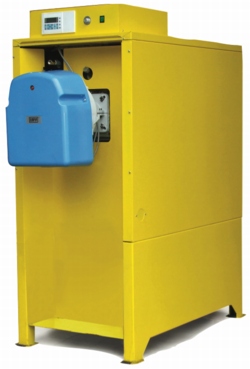Bio-fuels can be liquid too

With a 10% surplus of oil-seed rape being produced in the UK, Harry Howard discusses the potential for liquid biofuels for boilers — aided by the use of other waste oils.
There is a move right across the UK, aided by grants and tax-relief, to fit bio-liquid boilers as a means of reducing carbon emissions. Bio-liquids include rape-seed oil, vegetable and waste oils which are then transformed to B100 bio-diesel.
The advantages of bio-liquids are that they emit less climate-relevant carbon dioxide than fuels from fossil sources, they are more readily bio-degradable and they are more usually grown in the region where they are consumed, so transport costs and risk are minimised.
In addition, oil-seed rape is well suited to cultivation in the UK with good lengthy days during the Summer and freedom from excessive frosts throughout the year. Crushing the harvest, besides producing ample oil, also produces four times as much rapemeal — a large protein supplement for livestock.
From 2005 to 2008, the crop exceeded the UK use of oil-seed rape by around 10% of the production — amounting to about 225 million litres of oil.
For use in boilers, rape-seed oil is rather viscous, so it is transformed to B100 bio-diesel to EN 14214 standards. The remarkable feature of the process, called transferification, is that it can use a wide range of feedstocks — animal fats, used cooking oil and other virgin vegetable oils. One estimate is that ‘waste oil’ amounts to around 150 million litres of bio-diesel when cleaned, transformed and refined.
B100 produces 37 MJ/kg and one cubic metre of B100 contains 39 600 MJ. B100 is four times cheaper to transport and store for heating applications than bio-mass. (woodchip or pellets).
With typical combustion conditions, B100 bio-liquid has the following characteristics.
• Carbon monoxide lower than 20 ppm.
• NOx from 100 mg/kWh down to 40 mg/kWh, depending on the boiler.
• There is virtually no lead, no sulphur, no toxic compounds such as benzene, toluene and xylene, and particulate matter (soot). Smell is pleasant.
• Efficiency, depending on outside combustion air temperature, varies from 80% up to at least 97% GCV, depending on the type of boiler.
• Maximum flow temperature is 90°C and minimum return temperature is 20°C.

Today, all boilers for bio-fuel are technically very advanced. Superior in environmental performance, they are able to substitute almost fully for heating systems based on fossil energy. Through their possibilities of automatic control and their adaptation to computers, they mainly operate like conventional heating systems.
That minimum return temperature of 20°C implies that bio-liquid boilers can be run in condensing mode. One example is our R-Series boiler. The B100 bio-liquid is kept at temperatures just above freezing in an external or bunded vessel, then piped to a pre-heat tank within the R-Series boiler, from which it passes to the burner. It burns with the same maximum condensing efficiency as oil or natural gas, and the boilers attains 92% to 97% GCV efficiency.
The volume of hot flue gases is considerable and represents a substantial use of energy. This energy is partly in the form of sensible heat due to the elevated temperature of the gases, and partly as latent heat in the water vapour. The latent heat amounts to around 7% of the gross calorific value of the fuel.
R-Series condensing boilers are designed to recover much of the heat in the flue gases and consequently operate at much higher efficiencies. If the flue gases are cooled down to their dewpoint (50°C for B100) much of the latent heat, as well as the sensible heat, can be recovered. The R-Series boiler is designed to always operate in condensing mode; it uses corrosion-resistant plastic materials for all of the condensing heat exchanger and contains limestone granules to treat the acidic condensate before safe disposal to a drain.
The following information will help plan fuel-storage requirements.
A litre of B100 bio-liquid is equivalent to 8.4 kWh. A conventional high-efficiency boiler has an output of 6.5 kWh/l For a year-round condensing boiler, the minimum output is 7.75 kWh/l, rising to 8.1kWh/l in mid-Winter.
Four weeks’ mid-Winter consumption (allowing for sludge and water content) the year-round condensing boiler based on a 300 kW boiler, 7.75 kWh/l and 60 h per week would be 9290 l. Let’s say 10 000 l of storage using a tank 4 m long and 2 m in diameter.
Widely varying loads can be supplied, as the B100 bio-liquid R Series condensing boiler will operate efficiently down to 10% of maximum output, and it is capable of close control throughout the year.
In the typical London weather pattern, the boiler may be used to meet the base load throughout the year. A second fossil-fuel boiler will meet the extra demand of the peak winter months. Additionally both boilers can have dual-fuel B100 and fossil fuel capability to give an in-built standby facility.
Liquid bio-fuel boilers are suitable for almost all buildings. They are particularly relevant for use in buildings requiring long hours of boiler operation. The longer the hours a bio-fuel boiler runs, the larger the energy load it takes and the greater the environmental advantage.
Harry Howard is technical director with Atlantic Boilers.







